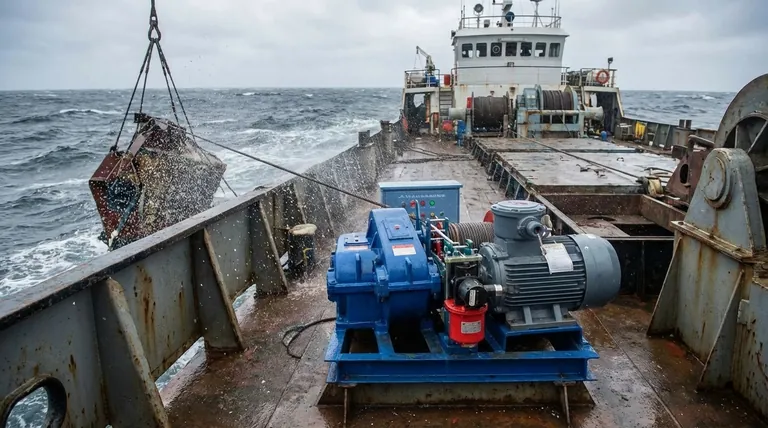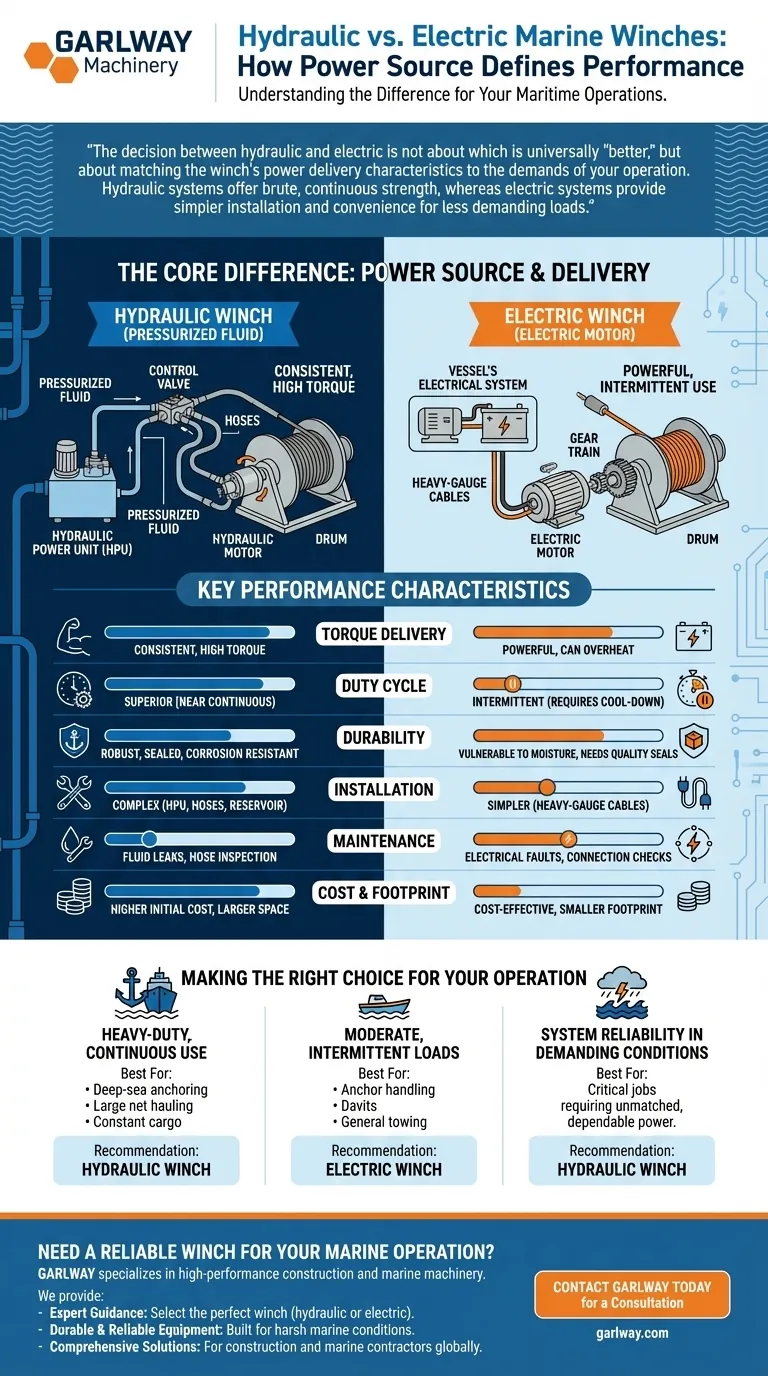At their core, a marine hydraulic winch and an electric winch are distinguished by their power source. A hydraulic winch uses pressurized fluid to generate immense and consistent mechanical force, while an electric winch uses an electric motor powered by the vessel's electrical system. This fundamental difference dictates their performance, durability, and suitability for specific maritime tasks.
The decision between hydraulic and electric is not about which is universally "better," but about matching the winch's power delivery characteristics to the demands of your operation. Hydraulic systems offer brute, continuous strength, whereas electric systems provide simpler installation and convenience for less demanding loads.

The Core Difference: Power Source and Delivery
The power source is the defining factor that influences every other aspect of the winch, from its components to its performance under strain.
How a Hydraulic Winch Works
A marine hydraulic winch is part of a larger system. A dedicated Hydraulic Power Unit (HPU) pressurizes hydraulic fluid, which is then directed through a control valve to a hydraulic motor. This motor converts the fluid's pressure into rotational energy, turning the winch drum. The force is constant and directly proportional to the fluid pressure, providing unwavering torque even under extreme load.
How an Electric Winch Works
An electric winch is a more self-contained unit. It draws power directly from the vessel's generator or battery bank to run an electric motor. This motor drives a gear train, which provides torque multiplication to turn the drum. Its power is dependent on the health and capacity of the ship's electrical system.
Comparing Key Performance Characteristics
While both winch types are used for hoisting, anchoring, and towing, their operational behavior differs significantly.
Power and Torque Delivery
Hydraulic winches excel at delivering consistent, high torque. They can pull massive loads for long periods without faltering because the hydraulic system can maintain pressure indefinitely. Electric winches can also be very powerful, but they may struggle or overheat under sustained, heavy loads, potentially drawing enough current to trip circuit breakers.
Duty Cycle and Reliability
The ability to manage heat gives hydraulic systems a superior duty cycle. The hydraulic fluid itself helps dissipate heat, allowing the winch to operate almost continuously in heavy-duty applications. Electric motors generate significant heat and often require cool-down periods to prevent damage, making them better suited for intermittent tasks.
Durability in Marine Environments
Both systems are built for the harsh marine world, but hydraulic components are often considered more robust. The sealed, heavy-duty nature of hydraulic motors and plumbing provides excellent protection against saltwater corrosion. Electric winches rely on high-quality seals and enclosures to protect sensitive electronics and wiring from moisture.
Understanding the System-Level Trade-offs
Choosing a winch involves evaluating the entire system, including its installation, maintenance, and potential points of failure.
Installation and Complexity
Electric winches are fundamentally simpler to install. They require heavy-gauge electrical cables run from a power source to the winch. Hydraulic winches demand a more complex installation, requiring a dedicated HPU, reservoirs, filters, and a network of high-pressure hoses connecting everything.
Maintenance and Potential Failures
The primary drawback of hydraulic systems is the potential for fluid leaks. A failed hose or fitting can be messy, environmentally hazardous, and disable the system until repaired. Maintenance involves checking fluid levels, filters, and inspecting hoses for wear. Electric systems are cleaner but are vulnerable to electrical faults, corroded connections, and motor burnout.
Cost and Footprint
Initially, the cost of a complete hydraulic system—winch, HPU, and plumbing—is typically higher than an electric winch of similar capacity. The hydraulic system also takes up more physical space on the vessel.
Making the Right Choice for Your Operation
Your decision should be guided by the specific demands of your vessel and the tasks you need to perform.
- If your primary focus is maximum lifting power and continuous, heavy-duty use: A hydraulic winch is the superior choice for deep-sea anchoring, large net hauling, or constant cargo operations.
- If your primary focus is installation simplicity for moderate or intermittent loads: An electric winch offers a more straightforward and often more cost-effective solution for anchor handling, davits, or general towing on many vessels.
- If your primary focus is system reliability in the most demanding conditions: The raw, brute-force nature of a hydraulic system provides an unmatched level of dependable power for the most critical jobs.
Understanding this fundamental difference in power generation empowers you to select the winch that will serve as a reliable tool, not a potential liability.
Summary Table:
| Feature | Hydraulic Winch | Electric Winch |
|---|---|---|
| Power Source | Pressurized Fluid (HPU) | Electric Motor (Vessel's System) |
| Torque Delivery | Consistent, High Torque | Powerful, but can overheat |
| Duty Cycle | Superior (Near Continuous) | Intermittent (Requires Cool-down) |
| Installation | Complex (HPU, Hoses) | Simpler (Heavy-Gauge Cables) |
| Best For | Heavy-Duty, Continuous Use | Moderate, Intermittent Loads |
Need a Reliable Winch for Your Marine Operation?
Choosing the right winch is critical for the safety and efficiency of your vessel. GARLWAY specializes in high-performance construction and marine machinery, including robust winches designed for demanding environments.
We provide:
- Expert Guidance to help you select the perfect winch (hydraulic or electric) for your specific load requirements and duty cycles.
- Durable & Reliable Equipment built to withstand harsh marine conditions, ensuring long-term performance.
- Comprehensive Solutions for construction companies and contractors globally who depend on tough, dependable machinery.
Let our experts help you make the right choice. Contact GARLWAY today for a consultation and discover the winch solution that powers your success.
Visual Guide

Related Products
- Electric 120V Boat Winch by Badlands
- Warn Winch Windlass Boat Trailer Winch
- Electric Hoist Winch Boat Anchor Windlass for Marine Applications
- Electric and Hydraulic Winch for Heavy Duty Applications
- Heavy Duty Electric Boat Winch Windlass Anchor
People Also Ask
- What are the differences between small and large winch drums? Optimize Your Pulling Power & Space
- What should operators do before leaving the hoist? Secure Your Site with a 2-Step Lockout Protocol
- What factors determine whether to choose a horizontal or vertical windlass? Match the right geometry to your boat's layout.
- What is the first safety measure recommended before operating an electric winch? A Guide to Safe and Effective Operation
- What should you not do with a winch? Avoid these critical mistakes to ensure safety and prevent equipment damage.
- What is the primary function of a hoisting device in engineering machinery? Unlock Power and Efficiency
- Why is professional training important for using electric winches? Ensure Safety and Maximize Performance
- How does a drum winch work? A Simple Guide to Powerful Pulling Force



















